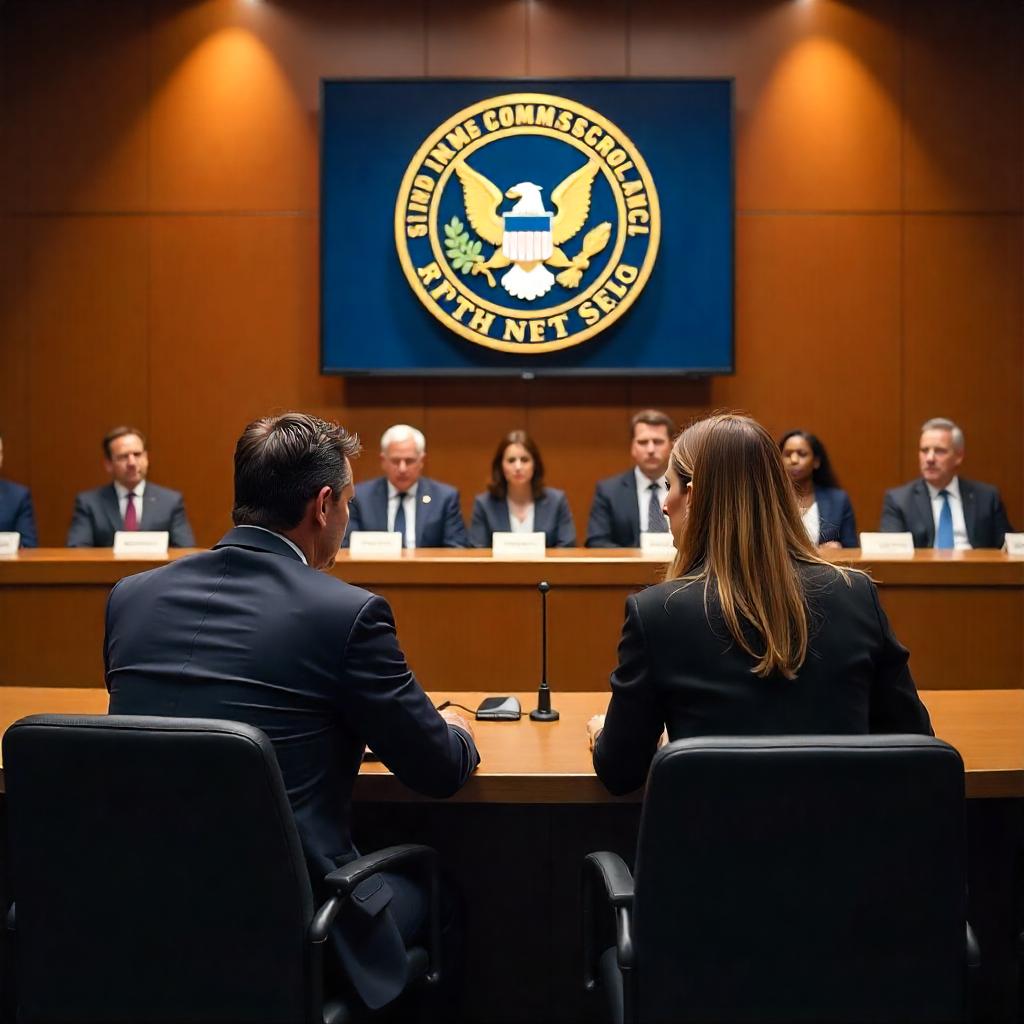Case Study 1: Stoner Cats NFT Project
Background
In July 2021, Stoner Cats 2 LLC (SC2) launched an innovative project combining blockchain technology with animated storytelling. The initiative aimed to finance an animated web series titled *Stoner Cats*, featuring a cast of celebrity voices including Mila Kunis, Ashton Kutcher, Chris Rock, and Jane Fonda. To fund the production, SC2 sold 10,320 non-fungible tokens (NFTs) at approximately $800 each, raising around $8.2 million in just 35 minutes.
SEC Allegations
The U.S. Securities and Exchange Commission (SEC) charged SC2 with conducting an unregistered offering of crypto asset securities. The SEC’s findings highlighted several key points:
- Marketing Strategies: SC2 promoted the NFTs by emphasizing the potential for resale profits, leveraging the involvement of Hollywood talent, and highlighting their expertise in crypto projects. These marketing efforts led investors to expect profits from the resale of NFTs in the secondary market.
- Economic Structure: The NFTs were configured to provide SC2 with a 2.5% royalty on each secondary market transaction. This incentivized SC2 to encourage trading, resulting in over $20 million spent across at least 10,000 transactions.
- Legal Violations: The SEC determined that the NFTs constituted investment contracts under the Howey Test, making them securities. SC2 violated Sections 5(a) and 5(c) of the Securities Act of 1933 by offering and selling these securities without proper registration.
Outcome
Without admitting or denying the SEC’s findings, SC2 agreed to a cease-and-desist order and paid a $1 million civil penalty. The company also agreed to destroy all unsold NFTs and publish a notice of the order on its website and social media channels.
Case Study 2: Impact Theory’s Founder’s Keys NFTs
Background
In late 2021, Impact Theory, a Los Angeles-based media and entertainment company, launched an innovative NFT project called “Founder’s Keys.” The company offered three tiers of NFTs—Legendary, Heroic, and Relentless—priced between 0.05 and 3 Ethereum (ETH) per token, collectively raising approximately $30 million from hundreds of investors across the United States.
The Founder’s Keys were marketed as exclusive access passes to Impact Theory’s future projects, including potential discounts, early access to content, and participation in community events. The company emphasized its ambition to build a media empire akin to Disney, aiming to deliver “tremendous value” to NFT holders.
SEC Allegations
In August 2023, the U.S. Securities and Exchange Commission (SEC) charged Impact Theory with conducting an unregistered offering of crypto asset securities in the form of Founder’s Keys NFTs. The SEC’s order highlighted several key points:
- Investment Contracts: The SEC determined that the NFTs constituted investment contracts and, therefore, securities under the Howey Test. Purchasers had a reasonable expectation of obtaining a future profit based on Impact Theory’s managerial and entrepreneurial efforts.
- Marketing Statements: Impact Theory’s public statements, including claims of building “the next Disney,” led investors to believe that the value of the NFTs would increase as the company succeeded in its endeavors.
- Use of Proceeds: The company collected proceeds from the NFT sales in a single crypto asset wallet and used a portion of those funds to pay vendors providing services related to its business.
Outcome
Without admitting or denying the SEC’s findings, Impact Theory agreed to a cease-and-desist order and paid a combined total of more than $6.1 million in disgorgement, prejudgment interest, and a civil penalty. The company also agreed to destroy all Founder’s Keys in its possession or control, publish notice of the order on its websites and social media channels, and eliminate any royalty that it might otherwise receive from future secondary market transactions involving the NFTs.
Implications for NFT Creators and Marketers
The SEC’s enforcement actions against Stoner Cats 2 LLC and Impact Theory LLC serve as pivotal case studies for NFT creators and marketers, highlighting the legal complexities and potential pitfalls in the rapidly evolving digital asset landscape. These cases underscore the necessity for a nuanced understanding of securities laws and the importance of aligning promotional strategies with regulatory expectations.
Legal Compliance and the Howey Test
At the heart of the SEC’s charges is the application of the Howey Test, a legal standard used to determine whether certain transactions qualify as investment contracts and thus fall under the purview of securities laws. The test considers whether there is:
- An investment of money
- In a common enterprise
- With an expectation of profits
- Predominantly from the efforts of others
In both the Stoner Cats and Impact Theory cases, the SEC found that the NFTs were marketed in a manner that led investors to expect profits primarily from the efforts of the issuers. This included emphasizing the potential for resale profits and the involvement of celebrity figures, which could influence the perceived value of the NFTs.
For NFT creators and marketers, this highlights the importance of carefully crafting promotional materials and public statements. Even indirect suggestions of profit potential can trigger regulatory scrutiny. It’s imperative to ensure that marketing strategies do not inadvertently position NFTs as investment vehicles unless they are registered accordingly.
Transparency and Disclosure
The SEC’s actions also emphasize the need for transparency and full disclosure in NFT offerings. Both Stoner Cats and Impact Theory were found to have made public statements that could mislead investors about the nature of the NFTs. For instance, Impact Theory’s assertion that purchasing a Founder’s Key was akin to investing in the next Disney project could create unrealistic expectations among potential buyers.
To mitigate legal risks, NFT projects should provide clear and accurate information about the nature of the NFTs, their intended use, and any associated rights or benefits. This includes disclosing whether the NFTs confer any ownership rights, access to content, or participation in future profits. Clear communication helps manage investor expectations and aligns with regulatory requirements.
Secondary Market Considerations
The secondary market for NFTs presents additional challenges. In the Stoner Cats case, the configuration of the NFTs to provide the issuer with a 2.5% royalty on each secondary sale was a focal point of the SEC’s investigation. This setup incentivized the issuer to encourage trading, which could be interpreted as an effort to generate profits from the efforts of others.
NFT creators and marketers should be cautious when designing royalty structures and consider the implications of secondary market activities. While royalties can be a legitimate revenue stream, they must be structured in a way that does not inadvertently classify the NFTs as securities. Consulting with legal professionals experienced in securities law can provide guidance on structuring such arrangements.
Broader Industry Impact
The SEC’s enforcement actions signal a broader regulatory trend that could impact the NFT industry as a whole. As the market continues to grow, increased scrutiny is likely, and other NFT projects may face similar challenges. This underscores the importance of proactive compliance measures.
NFT creators and marketers should stay informed about regulatory developments and consider implementing best practices to ensure compliance. This includes:
- Conducting thorough legal reviews of NFT offerings
- Implementing robust disclosure practices
- Designing royalty structures that do not implicate securities laws
- Engaging with legal professionals to navigate the complex regulatory landscape
By taking these steps, NFT projects can not only mitigate legal risks but also build trust with investors and contribute to the sustainable growth of the NFT ecosystem.
Conclusion
The SEC’s enforcement actions against Stoner Cats 2 LLC and Impact Theory LLC have illuminated the evolving regulatory landscape for NFTs, particularly concerning their classification as securities. These cases underscore the necessity for NFT creators and marketers to exercise caution and diligence in their promotional strategies and business practices.
Key Takeaways
- Understanding Securities Laws: NFTs marketed with the expectation of profit from the efforts of others may be classified as securities under the Howey Test. Both Stoner Cats and Impact Theory were found to have violated Sections 5(a) and 5(c) of the Securities Act of 1933 by offering and selling unregistered securities.
- Importance of Transparency: Clear and accurate communication about the nature of NFTs, their intended use, and any associated rights or benefits is crucial. Misleading statements or omissions can lead to regulatory scrutiny and potential legal consequences.
- Secondary Market Considerations: NFT creators should be mindful of the implications of secondary market sales, including royalty structures and resale expectations, as these can influence the classification of NFTs as securities.
- Proactive Compliance Measures: Engaging with legal professionals experienced in securities law, conducting thorough legal reviews of NFT offerings, and implementing robust disclosure practices can help mitigate legal risks and ensure compliance with applicable regulations.
Looking Ahead
The NFT space continues to evolve, and regulatory bodies are adapting to address new challenges and opportunities. While the SEC’s actions have provided some clarity, ongoing legal debates and lawsuits indicate that the classification of NFTs under securities laws remains a contentious issue. Creators and marketers must stay informed about regulatory developments and be prepared to adjust their practices accordingly.
By adhering to legal guidelines and maintaining ethical marketing practices, NFT projects can build trust with investors, foster innovation, and contribute to the sustainable growth of the NFT ecosystem.





